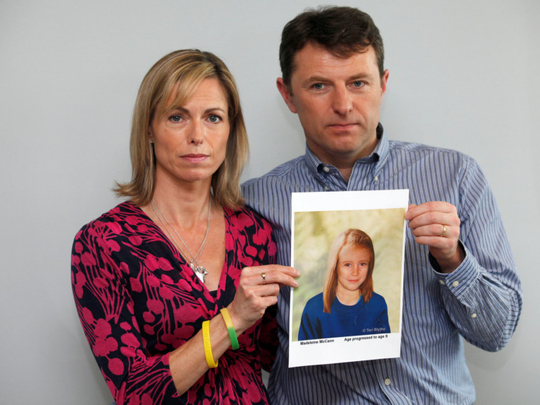
This is a story about missing children, and what happens to those who are left behind. Last week marked the 10th anniversary of the disappearance of Madeleine McCann, a story told so many times it has taken on the form of a litany: Praia da Luz, the tapas restaurant, the open window. Madeleine vanished, but she is ever-present in the public consciousness, whereas thousands of missing children are just that — wholly missing.
There has been much hand-wringing in the media over this disparity: was it because Kate and Gerry McCann are white and photogenic? Or because Madeleine was blond and cute? Or because she vanished in a country where journalists also take their cute kids on holiday? To which the answers are yes, obviously, but this is to miss the point; the argument should be not that the McCanns deserve less attention, but that other missing children should get more. In an interview last weekend, Kate McCann said she felt “guilty” and “embarrassed” about the £11 million (Dh52.4 million) spent on the search for her daughter.
The only people who should be embarrassed are those who sneer that there should be some kind of cap on the amount of sympathy, or a time limit placed on a parent’s hope. In recent weeks, the tabloids have been eagerly publishing spurious decades-old sightings of Madeleine, seen crying for her mother in the company of “suspicious men”. It is hard to see what any of this is supposed to achieve, beyond torturing the McCanns.
The common take on the McCann coverage is that middle-class newspaper readers related to them and so cared more about the story than, say, that of Ben Needham, the British toddler who vanished in Kos in 1991. And yet in both cases the parents were instantly vilified: Kerry Needham for being working class, Gerry and Kate McCann for being too self-possessed and attractive. The parents of missing children are often demonised by a public that need to reassure themselves that this could never happen to them. Those parents were feckless, foolish, bad — not like us, the good parents. If anything, the relatability of the McCanns made them even more terrifying, and thus more necessary to condemn.When Nick Cave’s 15-year-old son Arthur died in 2015, after falling off a cliff while on LSD, parts of the media were so keen to blame his father they became self-parodic. Much was made of the singer’s previous drug habit, as though no other parent on the planet had ever taken drugs, while the Times tutted that Cave had “an obsession with death” and watched “super-violent” films with his children. (The paper later removed the article from its website .)
In an extraordinary interview in American GQ , Cave recently said: “I don’t want to give too much oxygen to the matter of responsibility because it raises a point that only someone who knows nothing about parenting, drug-taking or bereavement would suggest.” Even so, he added: “You can find yourself indulging in all sorts of irrational and self-destructive thoughts — self-pity, self-blame — because they form a direct connection to the small but present part of you that just wants to die.”
A feeling lasting 30 years...
I have written a lot about missing or dead children: Etan Patz, the six-year-old who vanished in New York in 1979, and whose face haunted American parents in the ’80s; JonBenet Ramsey , the six-year-old beauty contestant found dead in her home in 1996; Noah Pozner, the youngest victim of the 2012 Sandy Hook shootings. All very different stories, all connected by a vilification of the parents by a public so terrified of anything like that happening to them. A police officer once described it to me like this: “You know that moment when you lose sight of your child in a shopping mall? Imagine that feeling lasting for 30 years.” But there is no need for anyone to pull an Andrea “as a mother” Leadsom here; anyone can feel that fear, as if your arm has been ripped off your body and your heart pulled out after it.
The cynical take on Madeleine McCann is that she is gone for good: why are we still talking about this? “Her parents need to accept their share of the blame and let her go,” one notoriously bilious columnist wrote. There is a condescension towards parents of missing children and their magical thinking, their desperate hope that the family will one day be reunited. But it’s their critics who are engaging in the worst kind of magical thinking, believing that if they turn bereaved parents into the demonised Other, they will protect their own children. All they are doing, really, is revealing that they know the terrible truth: that this could happen to any of us, and we would never stop looking.
— Guardian News & Media Ltd
Hadley Freeman is a Guardian columnist and features writer










